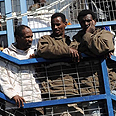
New infiltrator bill: Detention period significantly shortened
After High Court rejection, interior minister circulates new memorandum. Internment period shortened, center for migrants to be open during day and closed at night
The new amendment shortens the three-year detention period for asylum seekers to one year without trial and orders the construction and operation of a center for asylum seekers. The center will have an open-door policy during the day, but will be closed at night.
Related stories:
- Freed refugees banned from working in TA, Eilat
- State to build 'open jail' for migrants
- AG bypasses Supreme Court ruling on migrants
Saar is expected to present the new bill to the government over the course of the following month as a temporary order to be valid for three years.
According to the new bill, whose contents were first published by Ynet, it permits the detention of asylum seekers that enter the country only after the bill passes the Knesset: "The central issue is that the amendment applies to an infiltrator that enters Israel after this particular clause comes into effect.
"Thus it will be possible to realize the meaning of the law while balancing the difficulties discussed in the verdict – to prevent the entry of new infiltrators into Israel and to prevent these infiltrators from settling down in Israel, while providing a deterrent. With this we also need to try to give a balanced solution as such that the tens of thousands of infiltrators already in Israel are not affected."
According to figures from the Population, Immigration, and Borders Authority, Israel is currently home to 53,000 asylum seekers and infiltrators. Ninety percent of them are citizens of Sudan and Eritrea, countries whose citizens Israel avoids from deporting because of her international obligations.
New legislation follows footsteps of recent ruling
In the explanatory material provided by the memorandum it is written that the amendment "is meant to create a more balanced arrangement, which will provide more proportional means to deal with the situation and will thus comply with the legal standards decided by the ruling."
It is explained that the new bill "creates a fitting balance between the rights of Israel to protect her borders and prevent infiltration into her territory, and her obligation to act in a humanitarian manner towards everyone in her territory while protecting the human rights of the human being as a human being."
Furthermore, the new legislation will be part of a number of new methods to deal with the situation: others include the border fence with Egypt, the proposed center, and limitations on the places of residency and employment for asylum seekers and infiltrators.
The proposed legislation claims that "a deep examination of the verdict shows that the methodology of part of the court leaves room for new legislation that would include a short detention period."
The drafters of the legislation point to the words of the president of the Supreme Court: "The current circumstances do not prevent, in my opinion, to draft a new law that would allow detention for a period significantly shorter than three years."
They further use the words of Judge Neal Hendel: "In the new circumstances created, I am of the opinion that we could be satisfied with more moderate methods – a ceiling for detention that does not reach or get close to three years."
Target: Prevent migrant employment
According to the proposed legislation, it will be permissible to hold asylum seekers and infiltrators at the facility. "This center will serve as a shelter and will provide food as well as medical services to the infiltrators that will live there, as well as other necessities, and will provide a more measure method that is less harmful in comparison to alternative methods."
The new bill details the manner in which the center will operate: the manager of the establishment will be permitted to employ the migrants in assorted duties at the facility. The migrants will receive reasonable compensation, but there will be no employee-employer relations between the migrant of the center and the state.
The interior minister will decide the nature of residency at the center for asylum seekers. The asylum seekers will be asked to be present at the facility three times a day "so that the migrant could not work outside the center."
The proposal states that the migrants detained at the center will be given a monthly allowance according to a sum determined by the interior minister, with the agreement of the finance minister.
The police officers and soldiers that operate the center will be permitted to conduct a physical search on the migrants and their belongings without warrant when they enter and leave the facility, on public transportation, and if there is suspicion that they are carrying a weapon or forbidden items.
The manager of the facility will have the authority to take certain measures against migrants who do not fulfill the duties defined in the law. The measures include reprimand, warning, the imposition of monetary fines, and limitation on leaving the center.
If migrants do not present themselves at the open center, or if a migrant staying at the center breaks the laws governing his stay, the government will have the authority to transfer them to the closed detention centers.
- Receive Ynetnews updates directly to your desktop










